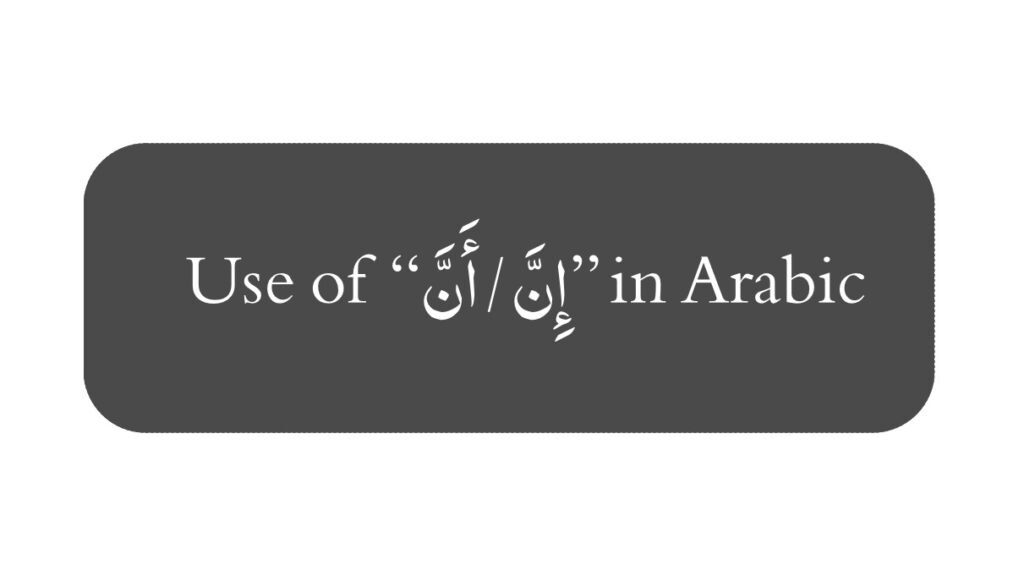
The Particles: “أنَّ” and “إنَّ”
These particles can be tricky to translate because of their specific grammatical functions.
1. “أنَّ” and “إنَّ” Overview:
Both are part of the group known as “إنَّ وأخواتها” (inna wa-akhawātuha) (Inna and her sisters), which also includes particles like “كَأَنَّ” (as if) and “لَعَلَّ” (perhaps). These particles share common features:
• They assign the subject noun (اسم) to the accusative case (منصوب).
• If the subject is not explicit, a pronoun must be added.
2. “إنَّ” Specifics:
• In Classical Arabic, it introduced sentences that didn’t start with a verb.
• In Modern Standard Arabic (MSA), it often serves as a sentence-initial intensifier, typically translated as “indeed.”
• Grammatical Rule: The اسم إنَّ (subject of inna) is accusative, while the خبر إنَّ (predicate) remains nominative.
Examples:
• إِنَّهُمْ يَعْتَقِدُونَ أَنَّ النِّهَايَةَ تُبَرِّرُ الْوَسِيلَةَ.
“They indeed believe that the end justifies the means.”
• إِنَّ الْبَابَ مَفْتُوحٌ.
“The door is open.”
Notes on Sentence Structure:
• When the subject is separated from the particle by an adverbial phrase, it stays in the accusative case.
Example:
• إِنَّ فِي الْقِطَارِ سَائِقًا.
“There is a driver in the train.”
“أنْ” and Conditional Sentences:
1. Function in Conditional Clauses:
• These particles introduce if-clauses in conditional sentences.
• Both أنَّ and إنَّ act as complementizers (equivalent to “that” in English).
2. Usage Differences:
• أنَّ tends to appear with verbs of perception (e.g., to believe, hear, think).
• إنَّ is commonly found with verbs of hope, expectation, or ability.
Examples of Collocations:
• مِنَ الْمُمْكِنِ أَنَّ (It is possible that…)
• مِنَ الْمَأْمُولِ أَنْ (It is hoped that…)
Key Rule: The verb following أنَّ appears in the subjunctive case.
Key Notes and Examples:
1. When translating, أنَّ/إنَّ must always be included, unlike “that” in English, which is often omitted.
Example:
• أَنْكَرَ أَنَّ هَزِيمَةَ الْفَرِيقِ قَدْ تُؤَثِّرُ عَلَى فُرَصِهِمْ.
“He denied that the team’s defeat could affect their chances.”
2. Sometimes, these particles are replaced by verbal nouns.
Example:
• سَيَكُونُ قَادِرًا عَلَى كِتَابَةِ الرِّسَالَةِ فِي الْمَطَارِ.
“He’ll be able to write the letter at the airport.”
3. In sentences where لكنَّ (but) is used, it introduces contrast and must be followed by a noun or pronoun.
Example:
• أَعْرِفُ أَنَّهُ لِصٌّ وَلَكِنِّي غَفَرْتُ لَهُ جَرَائِمَهُ.
“I know he is a thief, but I forgave him for his crimes.”
